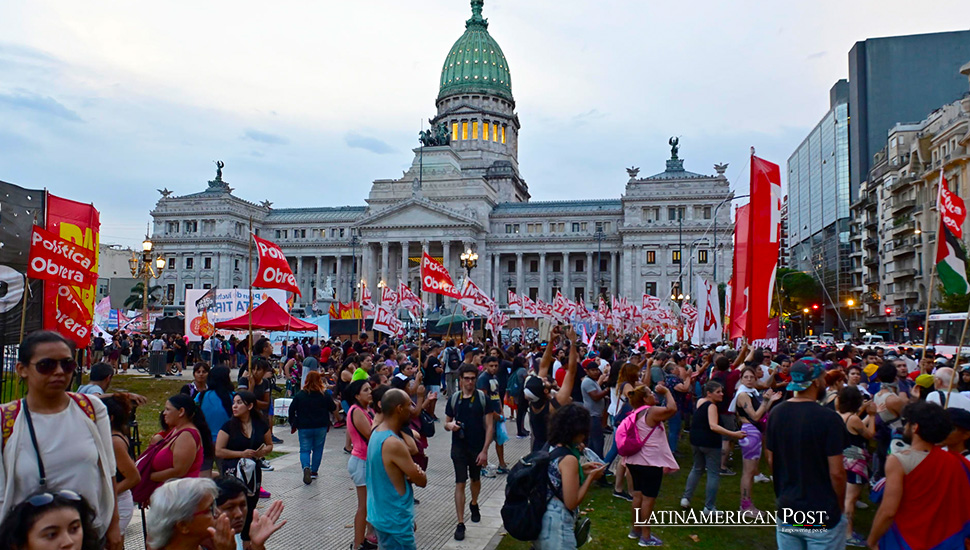Setback for Argentina’s Economic Reform as Milei’s Ambitious Package Faces New Legislative Hurdles

Argentina’s President Javier Milei faces a significant legislative challenge as his comprehensive economic reform package, including privatization and subsidy reduction measures, is returned to the committee following lawmakers’ rejection of critical provisions.
Setback for President Milei’s Economic Reforms
In a political landscape marked by its volatility, Argentina’s latest attempt at sweeping economic reforms has hit a roadblock, underscoring the complexities of governance in a divided legislature. President Javier Milei, known for his libertarian ideology, encountered a significant setback this week when his ambitious economic reform package was sent back to a legislative committee for further consideration. This development comes on the heels of lawmakers rejecting many of its provisions during an article-by-article approval process despite initially voting to approve the “omnibus” proposal in general terms.
The reform package, the subject of intense debate and substantial reworking by legislators, includes measures aimed at fundamentally altering the Argentine economy. Its key provisions include the privatization of state entities, sweeping changes to hundreds of regulations, and steps to enable significant reductions in state subsidies. These proposals reflect Milei’s vision for a more market-driven economy, free from what he perceives as the shackles of excessive government intervention.
However, the path to realizing this vision has proven to be fraught with obstacles. Milei’s ruling party, Libertad Avanza, holds only a small number of seats in Congress, limiting its ability to push through legislation without broader support. The party’s frustration was palpable in a recent post on X, which condemned the opposition’s resistance to the bill as “treasonous behavior.” This strong language reflects the high stakes in the debate over Argentina’s economic future and the deep divisions within its political landscape.
Opposition’s Call for Flexibility: Pichetto’s Critique
Opposition lawmakers, for their part, have called for greater flexibility from the ruling party. Miguel Pichetto, a prominent opposition figure, criticized Libertad Avanza’s approach to the legislative process, suggesting that a willingness to compromise could lead to more productive outcomes. “We ask the ruling party to have some flexibility. They love to keep losing,” Pichetto remarked during the session, highlighting the deadlock that has characterized recent legislative efforts.
The return of the economic reform package to the committee stage represents not just a procedural setback but also a symbolic defeat for Milei’s administration. It underscores the challenges of enacting significant policy changes in a political environment characterized by fragmentation and ideological polarization. For Milei, who has positioned himself as a disruptor intent on overhauling Argentina’s economic policies, this moment may necessitate reassessing strategies for building consensus and navigating the legislative landscape.
The implications of this legislative impasse extend beyond the immediate political fallout for Milei’s government. Argentina’s economy, grappling with longstanding issues such as inflation, debt, and sluggish growth, dire need of comprehensive reforms. The proposed measures, controversial though they may be, represent an attempt to address some of these deep-seated problems by reducing the fiscal burden of state subsidies and introducing more dynamism into the economy through privatization and regulatory changes.
Deeper Divide: Global Themes in Argentine Politics
However, translating these proposals into actionable policies has revealed the fault lines within Argentine politics. The debate over the reform package reflects broader tensions between those who advocate for a leaner, market-oriented approach to governance and those who caution against the potential social and economic consequences of rapid privatization and subsidy cuts. This divide is not unique to Argentina but is emblematic of broader global debates over the state’s role in the economy.
As the economic reform package returns to committee, the coming weeks and months will be critical for determining its fate. Milei and his party face the daunting task of negotiating with various political actors, each with their agendas and constituencies. The ability to forge compromises without compromising the reform agenda’s core principles will test Milei’s political acumen and leadership.
Also read: Argentina’s Bold Leap Forward: Embracing Milei’s Reforms for Economic Revival
The legislative challenges faced by President Milei’s economic reform package highlight the intricate dance of Argentine politics, where ambitious visions for change meet the realities of a fragmented legislative body. The setback serves as a reminder of the importance of dialogue, negotiation, and flexibility in pursuing transformative policies. As Argentina continues to navigate its complex economic and political landscape, the outcome of this legislative saga will have lasting implications for the country’s direction and its prospects for sustainable growth and stability.




